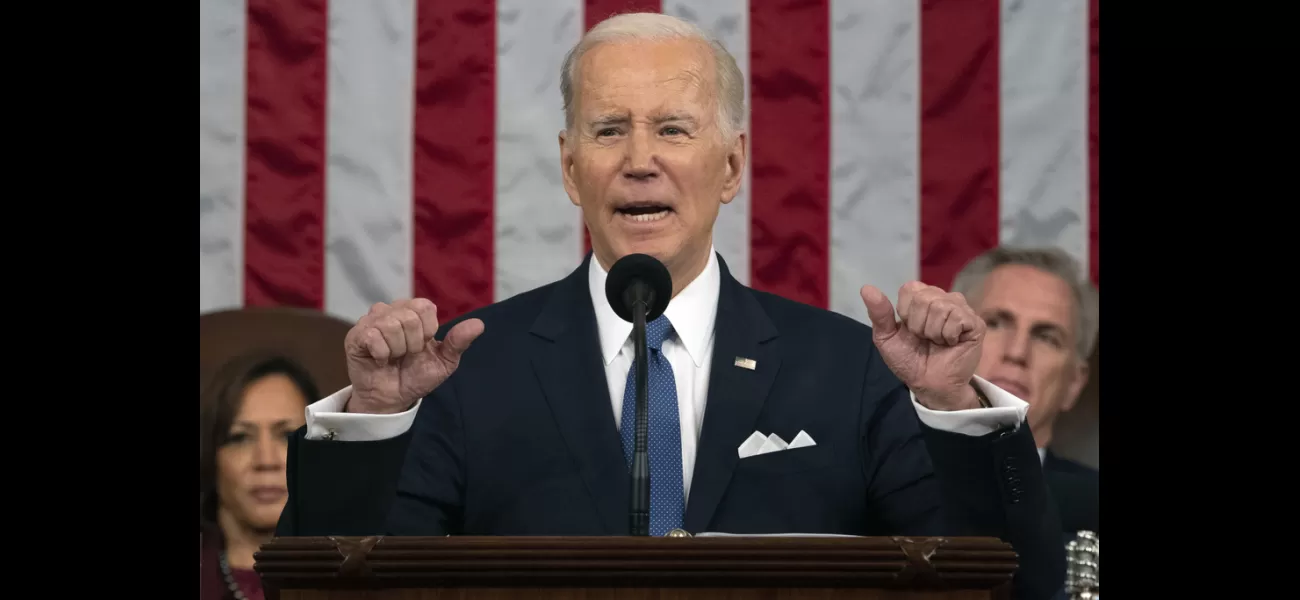Biden describes debate as negative. Medical professionals weigh in on how they would assess it.
Biden assures that he has medical doctors traveling with him, as every president does, from the best in the world.
July 7th 2024.

Joe Biden, the President of the United States, recently spoke about his performance in the debate last week. He admitted that it was not his best night, but also clarified that it was not an indication of any serious medical condition. Like all presidents, Biden also has a team of medical doctors who accompany him wherever he goes. They are from the best hospitals in the world, and they constantly evaluate his health and well-being.
During an interview with ABC News' George Stephanopoulos, Biden mentioned that he receives regular assessments from his doctors. He stated that they do not hesitate to inform him if they notice anything unusual or concerning. This ensures that he is always aware of his health and can take necessary measures if needed.
Following the debate, Biden spoke to his doctor and was told that he was simply exhausted. Being the President, he undergoes a full neurological test every day, which is a standard practice for someone in his position. However, experts who work with aging patients suggest that there is no single moment or test that can determine a person's mental fitness or ability to function. In-depth evaluations are necessary to gain a better understanding of a person's health and to rule out any potential problems.
These evaluations may include questionnaires, physical exams, blood tests, brain imaging, and interviews with the individual and their loved ones. In a recent analysis, CNN's chief medical correspondent, Dr Sanjay Gupta, suggested that President Biden should undergo detailed cognitive and neurological tests, and make the results public. According to Dr Gupta, these tests can help determine if there is a simpler explanation for the symptoms displayed or if there is something more concerning.
When asked about whether he has had cognitive tests and an exam by a neurologist, Biden responded with a no. He stated that his doctors have not suggested him to do so, and have assured him that he is in good health. He also gave no indication that he would be willing to undergo such tests in the aftermath of the debate.
As we age, it is natural for our cognitive abilities to change. However, the extent and timing of these changes vary from person to person. Studies have shown that slow, age-related cognitive decline starts around the age of 27, even for healthy and well-educated individuals. This decline primarily affects a person's reasoning and problem-solving skills, as well as their ability to maintain a conversation. However, it does not impair a person's ability to function normally.
Dr Charan Ranganath, a professor of psychology and neuroscience, explains that not everything declines with age. For example, the ability to remember facts, which is an essential skill for a president, does not disappear. It may take longer to recall information, but it does not mean that a person has lost that ability. On the other hand, Dr John Rowe, a professor of health policy and aging, states that aging can also bring improvements in certain areas, such as vocabulary. Therefore, it is important to understand that aging affects different individuals in different ways.
Another important aspect to consider is cognitive impairment, which is not a normal part of aging. It is defined as a loss of memory and other mental abilities that significantly impact a person's daily life. According to Rowe, it affects 12% to 18% of people over the age of 65 and becomes more prevalent with advancing age. By the age of 80, more than 25% of people may have mild cognitive impairment, which can lead to dementia in some cases.
To screen for cognitive impairment, doctors often conduct the Mini Mental State Exam (MMSE) or the Montreal Cognitive Assessment (MoCA). These tests evaluate a person's orientation, memory, language, and other cognitive functions. Former President Donald Trump, who has faced questions about his cognitive function, has repeatedly mentioned that he aced the MoCA. It is a 30-point test that takes around 10 minutes to complete and assesses various cognitive abilities.
US President Joe Biden has recently addressed concerns about his performance in last week's debate, stating that while it was a bad night for him, it is not indicative of a serious condition. In an interview with ABC's George Stephanopoulos, Biden reassured the public that he is constantly monitored by top medical professionals who travel with him wherever he goes. He also mentioned that he regularly undergoes assessments and is open to any feedback from his doctors.
Following the debate, Biden consulted with his doctor who told him that he was simply exhausted. As the President, he undergoes a full neurological test every day as part of his duties. However, experts who work with elderly patients say that determining one's mental fitness and ability to function cannot be based on a single moment or test. A more comprehensive evaluation is necessary, which may include questionnaires, physical exams, blood tests, brain imaging, and discussions with the individual and their loved ones.
In a recent analysis, CNN's chief medical correspondent Dr. Sanjay Gupta urged the President to undergo detailed cognitive and neurological tests and make the results public. He explained that such tests can help determine whether there is a simple explanation for the symptoms or if there is a more concerning issue at hand. When asked about this on Friday, Biden stated that he has not had cognitive tests or an exam by a neurologist, but his doctors have assured him that he is in good health.
It is important to note that cognitive changes are a normal part of aging and can vary from person to person. While some may experience a decline in reasoning and problem-solving skills, it is not significant enough to impair daily functioning. According to experts, these changes usually start around the age of 27, even for healthy and well-educated individuals. Dr. Charan Ranganath, a professor of psychology and neuroscience, explains that while the ability to remember facts may slow down with age, it does not disappear entirely. It just takes longer to retrieve the information.
Dr. John Rowe, a professor of health policy and aging, adds that aging can also bring about positive changes, such as an improved vocabulary. But it is not just memory that changes with age; other aspects such as reasoning, sociability, attention, and emotional stability may also be affected. Some may experience impairment, while others may actually see improvements. However, cognitive impairment, which affects daily life, is not a normal part of aging and occurs in a small percentage of people over 65. It becomes more prevalent with advancing age, and by 80, more than 25% of individuals may have some form of mild cognitive impairment.
To screen for cognitive impairment, a primary care physician may use tests such as the Mini Mental State Exam or the Montreal Cognitive Assessment. These tests evaluate different areas of cognitive function and can help identify any potential issues. Former President Donald Trump, who has also faced questions about his cognitive function, has stated that he "aced" the Montreal Cognitive Assessment, which takes about 10 minutes to complete.
In conclusion, while aging can bring about changes in cognitive function, it is not a definitive indicator of one's mental fitness and ability to function. It is important to undergo regular assessments and seek medical advice if any concerns arise. As for President Biden, he has reassured the public that his doctors have deemed him fit for his duties, and he has given no indication that he is willing to undergo further testing at this time.
During an interview with ABC News' George Stephanopoulos, Biden mentioned that he receives regular assessments from his doctors. He stated that they do not hesitate to inform him if they notice anything unusual or concerning. This ensures that he is always aware of his health and can take necessary measures if needed.
Following the debate, Biden spoke to his doctor and was told that he was simply exhausted. Being the President, he undergoes a full neurological test every day, which is a standard practice for someone in his position. However, experts who work with aging patients suggest that there is no single moment or test that can determine a person's mental fitness or ability to function. In-depth evaluations are necessary to gain a better understanding of a person's health and to rule out any potential problems.
These evaluations may include questionnaires, physical exams, blood tests, brain imaging, and interviews with the individual and their loved ones. In a recent analysis, CNN's chief medical correspondent, Dr Sanjay Gupta, suggested that President Biden should undergo detailed cognitive and neurological tests, and make the results public. According to Dr Gupta, these tests can help determine if there is a simpler explanation for the symptoms displayed or if there is something more concerning.
When asked about whether he has had cognitive tests and an exam by a neurologist, Biden responded with a no. He stated that his doctors have not suggested him to do so, and have assured him that he is in good health. He also gave no indication that he would be willing to undergo such tests in the aftermath of the debate.
As we age, it is natural for our cognitive abilities to change. However, the extent and timing of these changes vary from person to person. Studies have shown that slow, age-related cognitive decline starts around the age of 27, even for healthy and well-educated individuals. This decline primarily affects a person's reasoning and problem-solving skills, as well as their ability to maintain a conversation. However, it does not impair a person's ability to function normally.
Dr Charan Ranganath, a professor of psychology and neuroscience, explains that not everything declines with age. For example, the ability to remember facts, which is an essential skill for a president, does not disappear. It may take longer to recall information, but it does not mean that a person has lost that ability. On the other hand, Dr John Rowe, a professor of health policy and aging, states that aging can also bring improvements in certain areas, such as vocabulary. Therefore, it is important to understand that aging affects different individuals in different ways.
Another important aspect to consider is cognitive impairment, which is not a normal part of aging. It is defined as a loss of memory and other mental abilities that significantly impact a person's daily life. According to Rowe, it affects 12% to 18% of people over the age of 65 and becomes more prevalent with advancing age. By the age of 80, more than 25% of people may have mild cognitive impairment, which can lead to dementia in some cases.
To screen for cognitive impairment, doctors often conduct the Mini Mental State Exam (MMSE) or the Montreal Cognitive Assessment (MoCA). These tests evaluate a person's orientation, memory, language, and other cognitive functions. Former President Donald Trump, who has faced questions about his cognitive function, has repeatedly mentioned that he aced the MoCA. It is a 30-point test that takes around 10 minutes to complete and assesses various cognitive abilities.
US President Joe Biden has recently addressed concerns about his performance in last week's debate, stating that while it was a bad night for him, it is not indicative of a serious condition. In an interview with ABC's George Stephanopoulos, Biden reassured the public that he is constantly monitored by top medical professionals who travel with him wherever he goes. He also mentioned that he regularly undergoes assessments and is open to any feedback from his doctors.
Following the debate, Biden consulted with his doctor who told him that he was simply exhausted. As the President, he undergoes a full neurological test every day as part of his duties. However, experts who work with elderly patients say that determining one's mental fitness and ability to function cannot be based on a single moment or test. A more comprehensive evaluation is necessary, which may include questionnaires, physical exams, blood tests, brain imaging, and discussions with the individual and their loved ones.
In a recent analysis, CNN's chief medical correspondent Dr. Sanjay Gupta urged the President to undergo detailed cognitive and neurological tests and make the results public. He explained that such tests can help determine whether there is a simple explanation for the symptoms or if there is a more concerning issue at hand. When asked about this on Friday, Biden stated that he has not had cognitive tests or an exam by a neurologist, but his doctors have assured him that he is in good health.
It is important to note that cognitive changes are a normal part of aging and can vary from person to person. While some may experience a decline in reasoning and problem-solving skills, it is not significant enough to impair daily functioning. According to experts, these changes usually start around the age of 27, even for healthy and well-educated individuals. Dr. Charan Ranganath, a professor of psychology and neuroscience, explains that while the ability to remember facts may slow down with age, it does not disappear entirely. It just takes longer to retrieve the information.
Dr. John Rowe, a professor of health policy and aging, adds that aging can also bring about positive changes, such as an improved vocabulary. But it is not just memory that changes with age; other aspects such as reasoning, sociability, attention, and emotional stability may also be affected. Some may experience impairment, while others may actually see improvements. However, cognitive impairment, which affects daily life, is not a normal part of aging and occurs in a small percentage of people over 65. It becomes more prevalent with advancing age, and by 80, more than 25% of individuals may have some form of mild cognitive impairment.
To screen for cognitive impairment, a primary care physician may use tests such as the Mini Mental State Exam or the Montreal Cognitive Assessment. These tests evaluate different areas of cognitive function and can help identify any potential issues. Former President Donald Trump, who has also faced questions about his cognitive function, has stated that he "aced" the Montreal Cognitive Assessment, which takes about 10 minutes to complete.
In conclusion, while aging can bring about changes in cognitive function, it is not a definitive indicator of one's mental fitness and ability to function. It is important to undergo regular assessments and seek medical advice if any concerns arise. As for President Biden, he has reassured the public that his doctors have deemed him fit for his duties, and he has given no indication that he is willing to undergo further testing at this time.
[This article has been trending online recently and has been generated with AI. Your feed is customized.]
[Generative AI is experimental.]
0
0
Submit Comment





